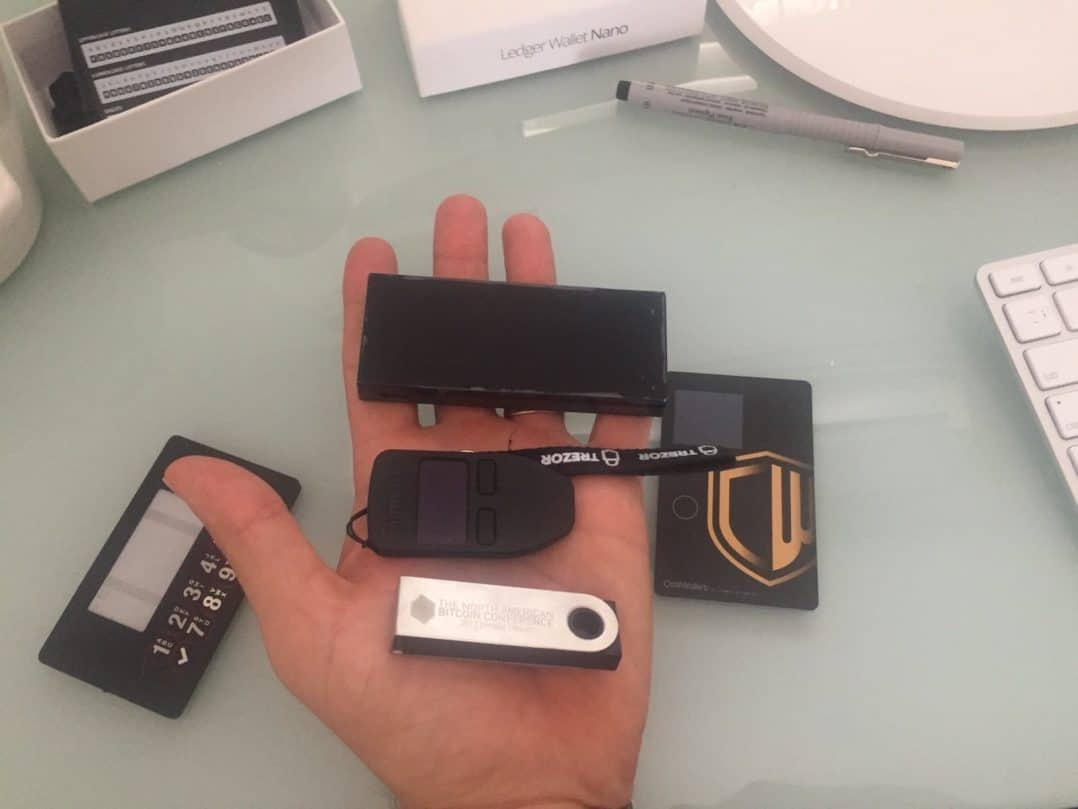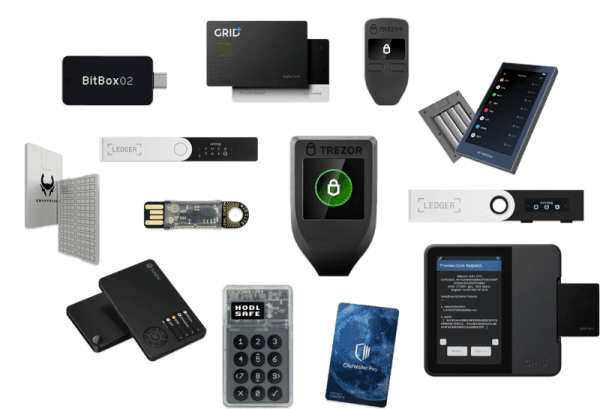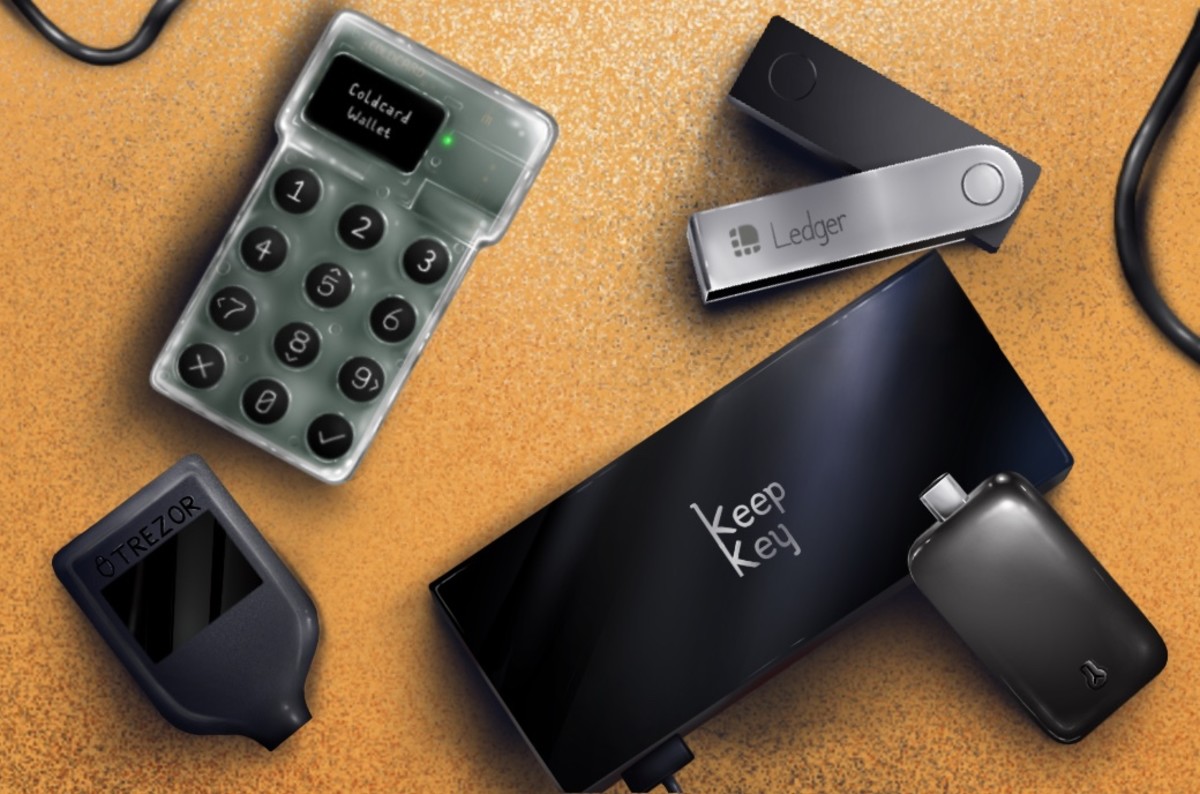If you’re into cryptocurrencies, you’ve probably heard of hardware wallets. These devices are known for providing the highest level of security when it comes to storing your digital assets. But what exactly are hardware wallets and why are they so important?
Simply put, hardware wallets are physical devices that store your private keys offline. Unlike software wallets, which are vulnerable to hacks and malware, hardware wallets keep your digital assets safe and secure. With the increasing threats and cyber attacks in the world of cryptocurrencies, using a hardware wallet is a must if you want to protect your investments.
Without a doubt, hardware wallets have been flying under the radar for the average crypto user. If you’re new to the world of hardware wallets, you may be wondering which one to choose and how to use it. Here’s where we come in. In this comprehensive guide, we’ll cover everything you need to know about hardware wallets, from the different types available to the steps on how to set them up and use them effectively.
So whether you’re a seasoned crypto investor or just starting out, this guide will provide you with all the information you need to make an informed decision when it comes to choosing the right hardware wallet for your needs. Read on to discover the world of hardware wallets and take your cryptocurrency security to the next level.
- A Comprehensive Guide to Hardware Wallets
- What are Hardware Wallets?
- Why Use a Hardware Wallet?
- Here’s How Hardware Wallets Work:
- Choosing the Right Hardware Wallet
- In Conclusion
- How Hardware Wallets Work
- They Protect Your Private Keys
- Safe With You
- Here’s why you should consider using a hardware wallet:
- Signing and Confirming Transactions on the Blockchain
- Security in Three Steps
- Dual Purpose of Hardware Wallets
- Private Keys Are the Key
- Wallet-to-Wallet Trading
- Convenience of Hardware Wallets
- Get Yourself a Hardware Wallet
- Super Secure Hardware Wallets
- Frequently Asked Questions:
- What is a hardware wallet?
- Why should I use a hardware wallet?
- How does a hardware wallet work?
- Are hardware wallets compatible with all cryptocurrencies?
- Can I recover my digital assets if I lose my hardware wallet?
- Video:
- 16 Things YOU DON’T KNOW About Hardware Wallets
A Comprehensive Guide to Hardware Wallets

If you’re into cryptocurrencies, you’re probably well aware of the need for secure storage solutions. With the increasing popularity of digital assets and the constant threats of hacking and theft, it’s crucial to keep your crypto investments safe.
One of the most known and trusted ways to do that is by using a hardware wallet. But what exactly are hardware wallets, and why are they so highly recommended? Let’s take a closer look.
What are Hardware Wallets?
Hardware wallets are physical devices designed to securely store your cryptocurrencies offline. They provide an extra layer of protection by keeping your private keys offline and away from any potential vulnerabilities on your computer or mobile devices.
These wallets come in the form of small USB-like devices and are known for their robust security features. They often have built-in screens and buttons for user-friendly interactions, making them easy to use even for beginners.
Why Use a Hardware Wallet?

The primary reason for using a hardware wallet is security. By storing your private keys offline on a hardware device, you significantly reduce the risk of your assets being hacked or stolen.
Unlike software wallets that are constantly connected to the internet, hardware wallets work without an internet connection, allowing you to safely manage your cryptocurrencies without exposing your private keys to potential threats.
Additionally, hardware wallets are backed by industry-standard security protocols and encryption algorithms, making them virtually impossible to crack or tamper with.
Here’s How Hardware Wallets Work:
1. When setting up a hardware wallet, you’re typically required to create a PIN code or passphrase. This acts as an added layer of protection, ensuring that only you can access your funds.
2. Once your hardware wallet is set up, it generates a unique seed phrase, also known as a recovery phrase. This phrase is a randomly generated combination of words that serve as a backup in case your device gets lost, stolen, or damaged.
3. With your hardware wallet connected to your computer or mobile device, you can securely manage and authorize transactions. The device will display the transaction details for you to verify, and you’ll need to physically confirm the transaction on the hardware wallet itself.
4. Hardware wallets are compatible with various software wallets and cryptocurrency exchanges, allowing you to easily send and receive funds from different platforms.
Choosing the Right Hardware Wallet

There are several hardware wallet options available in the market, each with its own set of features and supported cryptocurrencies. When selecting a hardware wallet, consider factors such as security features, ease of use, reputation, customer reviews, and compatibility with your preferred cryptocurrencies.
To make your decision easier, here are a few popular hardware wallets that are currently on the radar:
- Trezor
- Ledger Nano S
- KeepKey
These wallets have gained widespread recognition for their security, usability, and compatibility with a wide range of cryptocurrencies.
In Conclusion
If you’re serious about protecting your cryptocurrencies, a hardware wallet is the way to go. With their offline storage, advanced security features, and user-friendly interfaces, hardware wallets provide the peace of mind you need to confidently manage your digital assets.
How Hardware Wallets Work

If you’re into cryptocurrencies, you’re probably familiar with the concept of wallets. These digital wallets allow you to securely store, send, and receive your virtual currencies. However, when it comes to security, hardware wallets are a whole different ball game.
Hardware wallets, also known as cold wallets or offline wallets, are physical devices that store your private keys offline, making them immune to online attacks. Unlike software wallets or exchange wallets, which are connected to the internet, hardware wallets provide an extra layer of security for your crypto assets.
So, how do hardware wallets work? Let’s dive in:
- Private Key Storage: Hardware wallets securely store your private keys, which are needed to access and control your cryptocurrencies. These private keys are stored on a secure chip within the device, ensuring that they are protected from any external threats.
- Offline Transaction Signing: One of the key features of hardware wallets is their ability to sign transactions offline. When you want to send funds, the transaction details are transferred from the computer to the hardware wallet via USB or Bluetooth. The hardware wallet then securely signs the transaction using the private key stored on the device. This adds an extra layer of protection as the private key never leaves the hardware wallet.
- Verification: Another important aspect of hardware wallets is the verification process. Before you sign a transaction, the hardware wallet displays the transaction details on its screen for you to verify. This ensures that you are sending funds to the correct recipient and the correct amount, minimizing the risk of human error or malicious attacks.
- Backup and Recovery: Hardware wallets usually come with a backup and recovery process. During the initial setup, you will be provided with a recovery seed or mnemonic phrase. This seed consists of a series of words that can be used to recover your wallet in case it gets lost, stolen, or damaged. It is crucial to write down and store this seed in a safe place.
With hardware wallets, your private keys are backed by state-of-the-art security measures and are kept offline, away from prying eyes. This makes them an ideal choice for those who prioritize the safety of their crypto assets.
Now that you know how hardware wallets work, you’re well-equipped to keep your cryptocurrencies under the radar of potential threats.
They Protect Your Private Keys
When it comes to securing your cryptocurrencies, the most important thing is to protect your private keys. These keys are what give you ownership and control over your digital assets. Without them, you are unable to access or transfer your funds.
Heres where hardware wallets come into play. Unlike software wallets that store your private keys on your computer or smartphone, hardware wallets store your keys offline, away from the prying eyes of hackers and malware. This significantly reduces the risk of your keys being stolen or compromised.
Hardware wallets are designed with robust security features to ensure that your private keys are kept safe. They use advanced encryption technology and tamper-resistant hardware to protect against physical and digital attacks. Some hardware wallets even have built-in screens and buttons that enable you to securely enter your PIN or verify transactions.
Another advantage of hardware wallets is that they provide an extra layer of security by keeping your private keys separate from your computer or smartphone. Even if your device is compromised, hackers still wont be able to access your private keys stored on the hardware wallet.
Furthermore, hardware wallets are backed by a system of backups and recovery options. When you set up a hardware wallet, youll be provided with a recovery seed. This is a series of words that can be used to restore and access your funds in case your hardware wallet is lost, stolen, or damaged.
If youre serious about the security of your cryptocurrencies, a hardware wallet is a must-have.
Safe With You

When it comes to protecting your cryptocurrency assets, you can never be too careful. Storing your digital currencies in an online wallet leaves you vulnerable to hacks and theft. That’s why a hardware wallet is the safest option for keeping your cryptocurrencies secure.
A hardware wallet is a physical device that stores your private keys offline, away from the internet. With a hardware wallet, you’re in complete control of your assets. Your private keys never leave the device, and they’re securely stored on a chip.
Without access to your hardware wallet, no one can access your cryptocurrencies. It provides you with peace of mind, knowing that your assets are safe and secure.
Here’s why you should consider using a hardware wallet:

- Security: Hardware wallets are known for their high level of security. They offer protection against malware, viruses, and phishing attacks by keeping your private keys offline.
- Offline Storage: Your private keys are stored offline and never exposed to the internet, reducing the risk of hacking or theft.
- Backup Options: Most hardware wallets have backup options to ensure you never lose access to your funds. These backup options often come in the form of a recovery seed or passphrase.
- User-Friendly: Hardware wallets are designed with user-friendliness in mind. They usually have a straightforward setup process and a user-friendly interface.
- Wide Range of Supported Cryptocurrencies: Hardware wallets support a wide range of cryptocurrencies, allowing you to store different assets in one place.
Using a hardware wallet keeps you under the radar of potential hackers and helps you maintain full control over your cryptocurrencies. It’s a reliable and secure solution for long-term storage of cryptocurrency assets.
Signing and Confirming Transactions on the Blockchain
When you’re using hardware wallets, one of the most important functionalities is the ability to sign and confirm transactions on the blockchain. This process ensures the security and integrity of your transactions, as well as protects your funds from unauthorized access.
Hardware wallets, such as Ledger or Trezor, provide a secure environment for signing transactions. They use a combination of private keys and encryption to ensure that only the authorized user can access and sign transactions.
When you want to send a transaction, you start by connecting your hardware wallet to a computer or a mobile device. You then initiate the transaction on a compatible cryptocurrency wallet application. This could be a desktop wallet, a mobile wallet, or even a web-based wallet.
Once the transaction is initiated, it is sent to the hardware wallet for signing. The hardware wallet generates a digital signature using the private keys stored securely inside the device. This signature serves as proof that you are the authorized owner of the funds and that you approve the transaction.
The signed transaction is then sent back to the wallet application, which broadcasts it to the blockchain network. The network validates the transaction using the digital signature and includes it in a block on the blockchain. Once the transaction is confirmed by the network, it becomes permanent and cannot be reversed.
This signing and confirmation process ensures the security of your transactions by keeping your private keys offline and out of reach of potential hackers. Even if your computer or mobile device is compromised, your funds remain safe because the private keys are stored securely in the hardware wallet.
It’s important to note that the process may vary slightly depending on the specific hardware wallet and wallet application you’re using. However, the basic concept remains the same: you sign transactions offline using a hardware wallet and then broadcast them to the blockchain network for confirmation.
By using hardware wallets to sign and confirm transactions, you can carry out cryptocurrency transactions with peace of mind, knowing that your funds are protected and your transactions are secure. This is why hardware wallets have gained popularity and become well-known as a secure way to manage cryptocurrencies.
Security in Three Steps

When it comes to safeguarding your digital assets, nothing is more important than security. Hardware wallets provide an extra layer of protection by keeping your private keys offline and out of reach from hackers and malware. Here are three key steps to help you ensure the security of your hardware wallet:
- Choose a reputable hardware wallet: There are several hardware wallets available in the market, but not all of them are created equal. Look for a well-known wallet brand that has a track record of security and is backed by a reputable company. Stick to wallets that have undergone thorough security audits and have a strong community of users.
- Follow best practices for wallet setup and usage: Setting up your hardware wallet correctly is crucial. Make sure to follow the manufacturer’s instructions carefully, generate a strong and unique secure PIN, and securely backup your recovery seed phrase. Additionally, always verify the wallet’s checksum to ensure that the downloaded software is authentic.
- Keep your wallet software and firmware up to date: Wallet manufacturers regularly release updates to fix security vulnerabilities and introduce new features. By staying up to date with the latest firmware and software releases, you can ensure that your wallet is protected against any known exploits. Be sure to check for updates regularly and install them without delay.
Remember, security is a continuous process, and it’s important to stay vigilant and proactive when it comes to protecting your digital assets. By following these three steps, you can keep your hardware wallet and your cryptocurrencies safe and secure, under the radar of potential threats.
Dual Purpose of Hardware Wallets
Hardware wallets have become an essential tool for cryptocurrency holders. They provide a secure way to store and manage digital assets without relying on online platforms or software wallets. But did you know that hardware wallets serve a dual purpose? Not only do they keep your cryptocurrencies safe, but they also offer an additional level of privacy.
When you use hardware wallets, you’re taking your cryptocurrencies offline. This means that your private keys, which are necessary to access and manage your digital assets, are stored on a separate physical device that is not connected to the internet. Without these private keys, it’s virtually impossible for hackers to access your funds, even if they manage to hack into your computer or smartphone.
But the privacy benefits of hardware wallets go beyond just protecting your digital assets from hackers. Because hardware wallets keep your private keys offline, they effectively keep you off the radar of online entities that may be tracking your activities. With a hardware wallet, you can make transactions and manage your cryptocurrencies without leaving a digital trail. This is particularly important for those who prioritize anonymity and want to maintain control over their financial information.
Additionally, hardware wallets are known for their tamper-resistant features. They often include physical buttons or touchscreens, allowing you to confirm transactions directly on the device. This adds an extra layer of security, as it prevents any potential malware or phishing attacks from tricking you into approving fraudulent transactions. By physically verifying each transaction, you decrease the risk of falling victim to scams or malicious actors attempting to manipulate your digital assets.
Overall, hardware wallets offer peace of mind by providing both security and privacy for cryptocurrency holders. They ensure that your digital assets are backed by robust encryption and offline storage, protecting you from hackers and online threats. And at the same time, they allow you to keep a low profile and retain full control over your financial information. With these dual benefits, it’s no wonder that hardware wallets have become an essential tool for anyone serious about cryptocurrency.
Private Keys Are the Key
When it comes to securing your cryptocurrency holdings, private keys are the most important piece of the puzzle. Private keys are a string of numbers and letters that grant access to your digital assets. They are generated by your hardware wallet and are known only to you.
Private keys are backed by advanced cryptographic algorithms that make them virtually impossible to guess or break. This means that as long as you keep your private keys secure, your funds are safe from hackers and unauthorized access.
If you’re new to the world of cryptocurrency, you may be wondering why private keys are so important. Here’s a simple breakdown:
- Private keys are what prove your ownership of the cryptocurrency in your wallet.
- They allow you to send and receive funds securely.
- If you lose your private keys, you lose access to your funds forever.
Here’s why hardware wallets are on everyone’s radar when it comes to keeping private keys safe:
| Hardware Wallets | Software Wallets |
|---|---|
|
|
As you can see, hardware wallets provide an added layer of security that software wallets simply cannot match. By storing your private keys offline, you eliminate the risk of online threats and keep your funds safe.
Wallet-to-Wallet Trading
When it comes to buying and selling cryptocurrencies, there are several methods you can use. One popular option is wallet-to-wallet trading, which allows users to exchange funds directly between their wallets without the need for a third-party exchange.
Wallet-to-wallet trading operates on a decentralized peer-to-peer network, where users can connect with each other to trade cryptocurrencies securely and privately. This method is often preferred by those who prioritize security and control over their assets.
One of the main advantages of wallet-to-wallet trading is that it eliminates the need to trust an exchange with your funds. Instead, you are in full control of your cryptocurrencies throughout the entire trading process.
However, it’s important to note that wallet-to-wallet trading is not suitable for beginners or those unfamiliar with cryptocurrencies. It requires a certain level of technical knowledge and understanding of how wallets and blockchain technology work.
If you’re planning to engage in wallet-to-wallet trading, it’s essential to use a trusted and secure wallet. Security should always be your top priority, as any vulnerabilities in your wallet can expose your private keys and put your funds at risk.
There are several well-known wallet providers that offer wallet-to-wallet trading capabilities, such as Trezor, Ledger, and KeepKey. These hardware wallets are highly secure and often recommended by experts in the cryptocurrency industry.
Before you start wallet-to-wallet trading, make sure you familiarize yourself with the specific trading features and functionalities offered by your chosen wallet. Some wallets may offer additional features, such as multi-signature transactions or integration with decentralized exchanges.
In conclusion, wallet-to-wallet trading provides a secure and decentralized method for buying and selling cryptocurrencies. This method eliminates the need for a centralized exchange and allows users to retain full control over their funds. However, it requires a certain level of technical knowledge and the use of a trusted and secure wallet. If you’re new to cryptocurrencies or unsure about how wallets work, it’s recommended to do thorough research and seek expert advice before engaging in wallet-to-wallet trading.
Convenience of Hardware Wallets

When it comes to securing your cryptocurrencies, convenience is a key factor to consider. Hardware wallets offer a convenient and user-friendly solution for storing and managing your digital assets. Whether you’re a beginner or an experienced trader, here’s why hardware wallets are a popular choice:
- Offline Storage: Hardware wallets store your private keys offline, meaning they are not connected to the internet. This significantly reduces the risk of your funds being hacked or stolen by digital threats such as malware or phishing attacks.
- User-friendly Interface: Most hardware wallets come with a user-friendly interface that makes it easy for you to manage your cryptocurrencies. With a clear display and intuitive navigation, you can quickly access and confirm transactions without any hassle.
- Secure PIN Code: To access your hardware wallet, you’ll need to enter a PIN code or passphrase. This adds an extra layer of security, ensuring that only you have access to your funds. In case of theft or loss, hardware wallets generally have a failsafe mechanism, such as a backup seed phrase, to help you recover your funds.
- Multi-Currency Support: Hardware wallets often support multiple cryptocurrencies, allowing you to store and manage a diverse portfolio of digital assets in one place. Whether it’s Bitcoin, Ethereum, or any other popular cryptocurrency, you can keep them all in your hardware wallet.
- Portability: Hardware wallets are designed to be portable, making it easy for you to carry your digital assets wherever you go. Whether you’re traveling or simply want to have your funds readily available, you can easily keep your hardware wallet in your pocket or bag.
- Backup Options: Hardware wallets offer various backup options to ensure the safety of your funds. Whether it’s a printed recovery sheet or a backup seed phrase, you can create multiple copies and store them in secure locations. This way, even if you lose your hardware wallet, you can still recover your funds.
- Third-Party Integration: Many hardware wallets offer compatibility with popular cryptocurrency management platforms and applications. This allows you to easily integrate your hardware wallet with your preferred tools and services, making it even more convenient to manage your digital assets.
- Peace of Mind: With a hardware wallet, you can have peace of mind knowing that your cryptocurrencies are stored in a secure and reliable device. By keeping your funds off the radar and backed by advanced security measures, hardware wallets offer a trustworthy solution for protecting your digital wealth.
In conclusion, hardware wallets provide the convenience and security you need to confidently store and manage your cryptocurrencies. With their offline storage, user-friendly interface, multi-currency support, and portability, hardware wallets offer a comprehensive solution for all your digital asset needs.
Get Yourself a Hardware Wallet
If you’re serious about securing your cryptocurrency assets, getting yourself a hardware wallet is a must.
A hardware wallet is a physical device that securely stores your private keys offline, away from potential threats such as malware or hackers. Unlike software wallets, which are connected to the internet, a hardware wallet provides an added layer of security by keeping your keys offline.
With a hardware wallet, you can have full control over your cryptocurrency funds without relying on third parties. This means that even if a crypto exchange or online wallet gets hacked, your funds will still be safe and secure.
Hardware wallets are known for their high level of security and are backed by strong encryption algorithms. They are designed to be resistant to physical attacks and tampering, making them an ideal choice for long-term storage of your cryptocurrencies.
Not only do hardware wallets provide security, but they also offer convenience. These wallets are compatible with multiple cryptocurrencies, allowing you to store and manage different digital assets in one device.
Another advantage of using a hardware wallet is that it is user-friendly. Most hardware wallets come with a user interface that is easy to navigate, making it simple for both beginners and experienced users to manage their funds.
One of the main reasons why people choose to use hardware wallets is because they offer peace of mind. With your cryptocurrencies stored safely offline, you can rest assured that your funds are protected from online threats.
So, if you’re serious about securing your cryptocurrencies and want to keep them off the radar of potential hackers, investing in a hardware wallet is a wise decision. Here’s a step-by-step guide on how to choose the right one for you:
- Do your research: There are several hardware wallet options available in the market, each with its own features and price range. Make sure to read reviews and compare different models to find the one that best fits your needs.
- Choose a reputable brand: Stick to well-known and trusted brands to ensure the security and reliability of your hardware wallet.
- Consider ease of use: Look for a hardware wallet with an intuitive user interface that is easy to navigate.
- Check for compatibility: Make sure the hardware wallet you choose supports the cryptocurrencies you plan to store.
- Consider additional features: Some hardware wallets offer additional features such as password encryption, backup and recovery options, and integration with third-party wallets.
- Compare prices: While the security of your funds should be the primary consideration, it’s also important to consider the price of the hardware wallet and choose one that fits your budget.
- Buy from official sources: To avoid scams or counterfeit products, always purchase your hardware wallet from official sources or authorized resellers.
With these steps in mind, you’ll be well on your way to securing your cryptocurrency assets with a reliable and user-friendly hardware wallet.
Super Secure Hardware Wallets

When it comes to protecting your cryptocurrencies, you want to make sure that you’re using the most secure method available. That’s why hardware wallets are known as the best and safest way to store your digital assets. These wallets are physical devices that are designed to securely hold your private keys offline, away from any potential online threats.
Unlike software wallets, which are connected to the internet and can be vulnerable to hacking attempts, hardware wallets provide an added layer of security. They use advanced encryption methods and secure elements to protect your keys and ensure that only you have access to your funds.
One of the most well-known hardware wallet brands is Ledger. Ledger has a reputation for producing high-quality wallets that are backed by extensive security audits and testing. Their wallets come with a secure chip that stores your private keys and requires a physical confirmation to approve transactions, making it virtually impossible for anyone to steal your funds without physically accessing the device.
Another popular hardware wallet is Trezor. Trezor wallets also offer top-of-the-line security features and are backed by open-source software. This means that anyone can review and verify the code, ensuring that there are no hidden vulnerabilities. Trezor wallets also come with a password manager and support a wide range of cryptocurrencies.
So, if you’re serious about keeping your cryptocurrencies safe and secure, investing in a hardware wallet is a must. With their advanced security features and offline storage, you can rest assured that your funds are protected even in the face of sophisticated cyber attacks. So, don’t take any chances with your digital assets. Get a hardware wallet today and enjoy the peace of mind that comes with knowing that your cryptocurrencies are safe.
Frequently Asked Questions:
What is a hardware wallet?
A hardware wallet is a physical device that is used to securely store private keys and sign transactions offline. It provides an extra layer of security by keeping the private keys offline, away from potential hackers.
Why should I use a hardware wallet?
Using a hardware wallet provides a higher level of security compared to software wallets or storing your private keys online. It protects your digital assets from online threats such as hacking and phishing attacks as the private keys are stored offline.
How does a hardware wallet work?
A hardware wallet generates and stores private keys offline. When a transaction needs to be signed, the hardware wallet securely signs the transaction using the private keys stored within the device. This ensures that the private keys never leave the wallet and are not exposed to potential threats.
Are hardware wallets compatible with all cryptocurrencies?
Hardware wallets are designed to be compatible with multiple cryptocurrencies. Most hardware wallets support popular cryptocurrencies such as Bitcoin, Ethereum, and Litecoin. However, not all cryptocurrencies are supported, so it’s important to check if your preferred cryptocurrencies are compatible with the hardware wallet you choose.
Can I recover my digital assets if I lose my hardware wallet?
Yes, most hardware wallets come with a recovery seed or mnemonic phrase that allows you to recover your digital assets in case your wallet is lost, stolen, or damaged. It’s important to keep this recovery seed in a secure location and never share it with anyone.
Video:
16 Things YOU DON’T KNOW About Hardware Wallets








